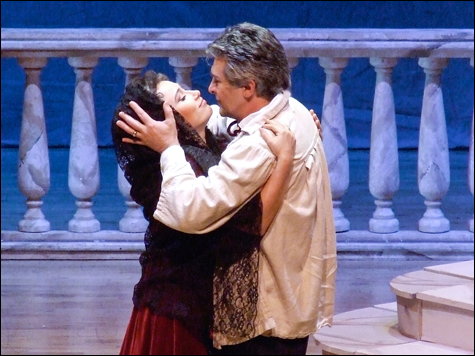
TOSCA: Nothing boring or passionless about this Tosca and Scarpia, or the Teatro Lirico production. |
Classical music in 2008 Boston did not get off to a brilliant start. Rafael Frühbeck de Burgos led the Boston Symphony Orchestra in two uninspired programs, the first with two over-familiar Richard Strauss tone poems (Don Juan, Till Eulenspiegel) and the even more familiar Ravel orchestration of Mussorgsky’s Pictures at an Exhibition, the second with Norwegian soloist Leif Ove Andsnes in the Rachmaninov Second Piano Concerto (“Full Moon and Empty Arms”) and yet another Strauss tone poem, the Alpensinfonie, glamorously orchestrated but endless Hi Def travelogue music. (The sun rises; we go up the mountain; we get to the top; a storm comes; we go back down; it gets dark.) Andsnes may be too refined a player to go up against Rachmaninov’s deep, dark, throbbing violins. (The BSO’s were luscious.) But his understated poetic sensibility, subtle phrasing, and impeccable execution were refreshing. John Ferillo’s insinuating oboe solo in Don Juan and Kenneth Radnowski’s alto saxophone in the Mussorgsky were particular treats.
The following week, Sir Colin Davis (now a dapper 80!) led Mozart: a transparent but stodgy Linz Symphony (a masterpiece Mozart threw together in less than a week) and a touching 23rd Piano Concerto, his most intimate, with Mitsuko Uchida, who played perhaps more for pathos than for a deeper melancholy. Still, Mozart with any soul at all is rare enough, and Uchida’s ravishingly delicate touch was an audible pleasure. Davis followed Mozart with a zippy, buoyant, Mozartian account of Schubert’s Second Symphony, a piece composed when he was only 16 but already Schubert.

The Handel and Haydn Society had what might have been a good idea: combining music written for a variety of 17th- and 18th-century English theatricals with a trio of actors reading dramatic scenes from the same period. For this sort of mélange to work, the music and the drama need to illuminate, or at least reflect, each other. But the concert was a jumble. The two Huntington Theatre actors, and even the charismatic Blair Brown, in some of theater’s craftiest, sexiest scenes, read too fast, didn’t project (the edge of the Jordan Hall stage is a tricky place to project from), and delivered most of their lines as if they were all too, too precious for words. Huntington director Nicholas Martin wrecked a more raucous scene from John Gay’s The Beggar’s Opera (the source of Mack the Knife) by having the actors speak a passage that actually includes several songs — marvelous songs with more memorable tunes most of the other music on the program. And the actors might have sung at least as well as Jason Grant, the young bass who gargled his way through most of his music. Nothing Grant did, however, was as uncomprehending as Mark Blum’s recitation of Prospero’s “Our revels now are ended” speech from The Tempest, with his consistent emphasis on the wrong words: “We are such stuff as dreams are made on”; “spirits . . . melted into air, into thin air” (as opposed to thick air?).
British conductor Philip Pickett, director of early music for London’s Globe Theatre, seemed yet another rumty-tum-tum historical informant. The musical selections were in roughly chronological order, but I didn’t hear much distinction between Purcell and Handel, decades apart. (Or were the examples simply too brief and fugitive to allow any distinctions to register?) Soprano Nathalie Paulin, at least, sang Dido’s sublime lament “When I am laid in earth” with affecting, unaffected purity of tone and an honest, unfussy directness that stood out.
Susan Davenny Wyner was, I’m happy to say, back in Boston as guest conductor of Pro Arte Chamber Orchestra, leading a program called “Hurray for Hollywood.” It’s a bit of a stretch to call Mozart’s Eine kleine Nachtmusik movie music, but it got a lovely reading full of imaginative dynamic contrasts. The high point was a suite from Bernard Herrmann’s haunting and dazzling score for François Truffaut’s Fahrenheit 451. Herrmann is one of the few movie composers whose music is good enough to work in a serious concert. Tintinnabulating percussion with glittering glockenspiel (Jeffrey Fischer and Robert Schulz) and uncanny harps (Martha Moor and Barbara Poeschl-Edrich) added evocative colors to the strings. Wyner caught every magical and gripping turn. Barber’s Adagio for Strings (Oliver Stone used it in Platoon) was perhaps more emphatic than it needed to be. This piece is so effortlessly gorgeous, the cooler it’s played, the more emotion it seems to have.
Violinist Elizabeth Pitcairn closed the program in John Corigliano’s saccharine Red Violin Suite, playing the extraordinary “Red Mendelssohn Stradivarius” that I gather inspired the 1998 François Girard movie Le violon rouge. This music is so ersatz, I had a hard time telling the difference among sections marked “Shanghai,” “Gypsy Cadenza,” and “Coitus Musicalis” (what was that supposed to suggest?). Hollywood is called a dream factory — The Red Violin is less dream than factory.